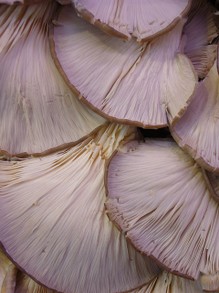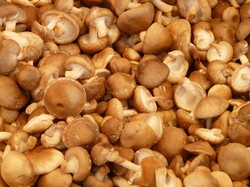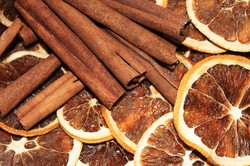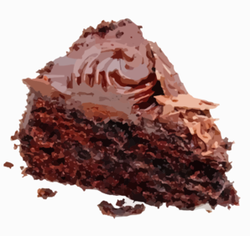Now I'll give you a heads up here -- I'm not a health professional. However, I have a vested interest in anything that is used to fight cancer cells. Doesn't everyone know someone with cancer these days?
My son is an acupuncturist and he is also someone who has researched the health benefits of local plants and fungi. Mushrooms, especially certain kinds, he tells me, are good at boosting your immune system and can even be used in an anti-cancer diet when you are facing the dreaded disease.
The man in the "How to Grow Gourmet Mushrooms" video says that some mushrooms kill cancer cells. I can't say for sure whether that statement is true, but in my way of looking at things, if you can alter your diet to promote good health, you'd be foolish not to at least try that method, even if you are receiving medical treatments.
Of course, if you have cancer, you'd want to check with your doctor first to make sure whatever natural methods you are using to combat the disease don't interfere with whatever pharmaceuticals you are taking. Some substances may interact, as plants can have powerful agents in them, too.
Mushrooms, however, so I am told, do not cause a problem in this way, but as I've said already, be sure to check with your doctor before you mess around too much. I had a friend once who almost died because he didn't inform his doctor he was taking herbal supplements and there was a drug interaction that he wasn't expecting.













 Children Learn Through Playon 09/17/2015
Children Learn Through Playon 09/17/2015
 Boston Public Gardenon 06/19/2015
Boston Public Gardenon 06/19/2015
 Remembering the Supremeson 01/20/2014
Remembering the Supremeson 01/20/2014
 How to Help Your Baby Sleepon 09/14/2013
How to Help Your Baby Sleepon 09/14/2013



Comments
Good point, @frankbeswick .
@Veronica That's true as long as we haven't destroyed the environment around us. So many "weeds" are actually medicinal. Developments so often crowd out or even poison many naturally occurring plants and push the animals into smaller spaces.
One important safety rule is that you should not pick buttons [young mushrooms] as at the button stage there is little or no way to properly distinguish between species. You should also examine the habitat in which the mushroom is found, as this is part of its identification.
I do believe that we should eat seasonal food and what is about us. We forage when we can. I feel that nature has given us what we need at specific times of year.
@frankbeswick I agree with your statement "Take no risks with mushrooms." Edible varieties can look different from place to place. You can do serious damage to your liver if you eat "inedible" mushrooms, even if they are not listed as "poisonous."
@frankbeswick A good book can be helpful, but it's better to go out with someone who knows their mushrooms. When I forage, I keep to a couple of varieties that I'm sure of. It's no fun if you make a mistake.
I'm glad you found it useful, @Veronica. If you still want to forage for them, going with someone who knows their mushrooms is a good idea. You can check a mushroom against a picture in a book, but some varieties have poisonous look-alikes. It's always better to learn about varieties from an expert.
@happynutritionist You do have to know what you're doing when growing mushrooms. Having a good source of mycelium is key.
A point that I need to clarify is that there are no seriously poisonous agarics, but the yellow stainer, found in British woodlands, is a slightly poisonous agaric. It will give you belly ache, as it contains an irritating acid.
Seriously poisonous mushrooms include Death Cap, Destroying Angel, Fool's Mushroom, Fly Agaric, Panther Cap, False Morel, Inocybe and some related species, but this list is not exhaustive, and there are other poisonous kinds. There are others that are inedible, but not poisonous. It is always wise to play safe when picking mushrooms. Take no risks with mushrooms.
There are some poisonous mushrooms, but members of the Agaric family, which are the main domestic ones, are not among them. Fly agaric is not an agaric, it is an Amanita, and is dangerous. The safest option is not to pick wild mushrooms if you don't know enough. Get a good book on the subject.